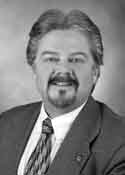 | Robb Rose is Director of Marketing Operations at Wesley Rehabilitation Hospital of Wichita. Robb is also a Respiratory Therapist, Boarded Disability Analyst and Adjunct Faculty for Wichita Sate University. He holds a Masters in Human Resources from Webster University. Robb serves on the American Lung Association Regional Council and the American Heart Association Board of Directors. Robb is married and has 2 children. He can be reached at (316) 729-9999 |
Health & Rehabilitation
2008-08-01 09:35:00
Parkinson’s disease
Question: My father is 55 and has recently experienced a lot of shaking and what seems to be temporary paralysis. Is this “Parkinson’s”? What kind of treatment should we seek?
Answer: Parkinson’s disease is a progressive nerve disorder caused by degeneration of brain cells that control movement. It shows up as tremors, muscle stiffness, rigidity, loss of balance and slowness of movement.
As many as 1 million Americans are believed to have the disease, with 60,000 new cases diagnosed each year, according to the Parkinson’s Action Network. Conservative estimates of costs in the United States are over $25 billion a year.
The average age of a Parkinson’s patient is 60 — although actor Michael J. Fox was diagnosed at age 30 — and slightly more men than women get the disease. Other famous patients include former U.S. Attorney General Janet Reno, Muhammad Ali and Pope John Paul II.
It is important to detect and treat Parkinson’s as early as possible, by consulting a specialist (neurologist) or an internal medicine specialist, before nerve damage is permanent. Your father should begin by consulting with his primary care physician. Treatment should focus on preventing falls, contractures and disability, and slowing the rate of decline.
Physical therapy helps patients be more active and less rigid with less slow movement. It improves their walking, balance and coordination, and that enhances their daily activities — always with a goal of safety and independence. Occupational therapy uses adaptive equipment and modifies patients’ personal environment and personal items. Speech therapy focuses on voice volume, speech pattern modification, breathing, memory and vocal exercises. Swallowing assessment and therapy for dysphasia and drooling has good outcomes. Psychotherapy and/or support groups help patients with coping skills, depression and anxiety.
Support from you and other family members and friends will go a long way to ensure positive outcomes from whatever treatment your father receives.


